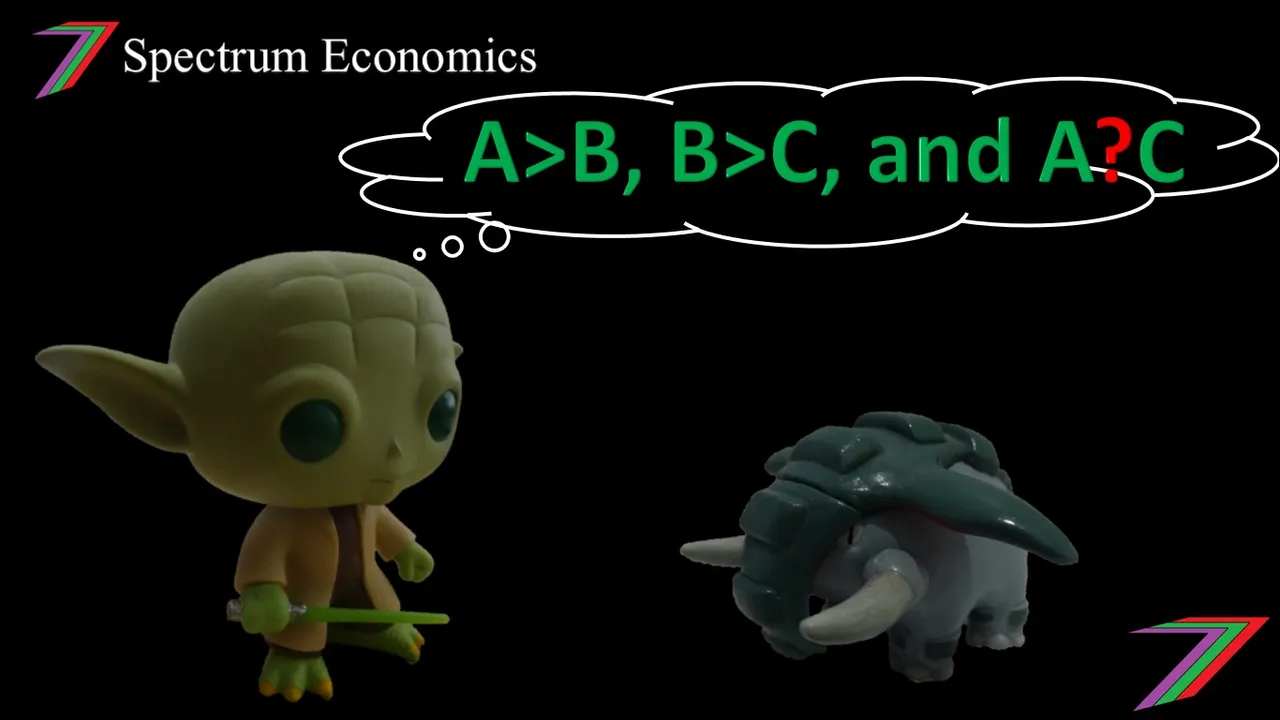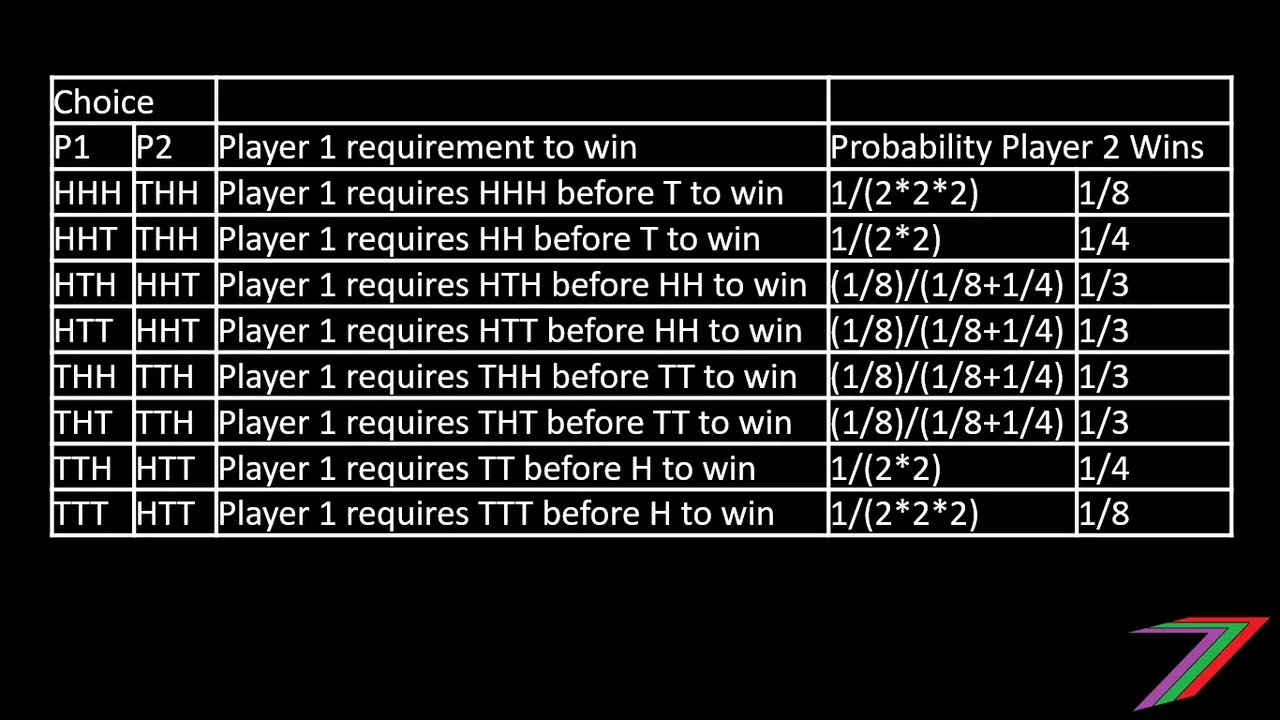Hi Everyone,

In this post, I would like to visit what I consider an important element of ‘Game Theory’, which is rarely discussed or questioned. This is called ‘Transitivity’. Transitivity is often an assumption applied to decision-making. For example, if Jane prefers oranges to pears and pears to apples, she will therefore prefer oranges to apples. This assumption appears straightforward and intuitive. This assumption is applied to many decision-making theories and models.
The ‘transitivity’ assumption cannot always be applied. This is more likely to happen in a complex decision-making model or scenario. If one characteristic is being compared, the transitivity assumption should hold true. If comparisons are made between commodities or phenomena that have many characteristics, it is possible that one-on-one comparisons can lead to different choices. For example, small difference in characteristics could go unnoticed and only larger differences are observed. Therefore, choices could be made depending on if strengths happen to align with weaknesses. Table 1 shows a comparison between 3 products with 6 characteristics.
Table 1: Non-transitive relationship between products based on perceptions

Note: Green shaded boxes are chosen over red shaded boxes*
If differences in characteristics of just 1 are not noticeable to decision-makers, Product B would be preferred to Product A, Product A would be preferred to Product C, and Product C would be preferred to Product B.
The ‘transitivity’ assumption is often not fulfilled in competitive games or sports. Rock paper scissors game is a perfect example of a game that does not meet the ‘transitivity’ assumption. Rock beats scissors and scissors beats paper but rock does not beat paper. Non-transitive relationships between rock, paper and scissors is logical for the game to function. If transitivity existed, everyone would choose the dominant choice and the game loses its randomness.
Penney’s Game is a typically described game to demonstrate non-transitive relationships between choices. Penney’s Game requires players to predict the sequence of coin tosses. A basic game would involve predicting 3 consecutive tosses. This game is assumed to continue until a winner is determined.
The player that goes second has a second mover advantage as he or she can respond with a more favourable sequence. Table 2 explains how this can be achieved and how the probabilities are determined.
Table 2: Penney’s Game responses

If Player 1 chooses 3 heads in a row, Player 2 should choose tails followed by 2 heads. The only way Player 1 can win is if the first 3 coin tosses result in heads. The moment a tails is flipped, Player 1 cannot win as Player 2 will only need 2 heads in a row to win, which will always occur before 3 heads in a row.
If Player 1 chooses 2 heads followed by 1 tail, Player 2 should choose tails followed by 2 heads. The only way Player 1 can win is if the first 2 coin tosses result in heads. Once a tails is flipped, Player 1 cannot win as Player 2 will only need 2 heads in a row. Choosing 2 heads followed by a tails flip gives Player 1 a better chance than choosing just heads as only 2 heads flips are required to begin the game, hence Player 1 has a ¼ chance of winning.
If Player 1 chooses tails followed by 2 heads, Player 2 should choose 2 tails followed by heads. Player 2 has an easier win position. For Player 2 to win, tails needs to be rolled twice in a row. The next heads will win regardless of how many tails are rolled prior. For Player 1 to win. Tails followed by 2 heads must be rolled, the moment a tails is rolled the three in a row sequence must be restarted.
Non-transitive relationship between sports teams

In sports, it is quite common to see a particular team dominant over another team. The phrase ‘bogey team’ is often used. The team that is generally considered better often loses to another particular team. There could be any number of reasons for a team to have a ‘bogey team’. Such reasons could include the ability to exploit a weakness, contrast in coaching styles, unfavourable home venue, or psychological. For the best team to be fairly determined, many games would be required to be played against many different opponents. Therefore, leagues are more likely than knock-out/elimination tournaments to produce a winner that reflects the best team in a particular competition.
The often non-transitive relationship between sporting teams also presents strategic opportunities for teams. A top team’s ‘bogey team’ can be studied to determine how this team has been effective and if there is anything this ‘bogey team’ is doing that can be replicated in some way.
I will write a more detailed post focusing on the National Football League (NFL). That post will focus on how teams have and/or could exploit weaknesses in opponents by understanding non-transitive relationship between teams.
Conclusion
This post focused on transitivity as an assumption in ‘game theory’, which can be violated under certain circumstances. Rock paper scissors and Penney's games provided basic examples of when this assumption is violated. Limits to our perceptions can also can cause non-transitive decisions when comparisons are made between products with multiple characteristics.
The violation of the transitivity assumption can lead to interesting opportunities. This is particularly true when we consider team sports. I will discuss such implications and strategies in another post. In a different post, I will also consider how non-transitive circumstances effect decisions in areas other than sports and how understanding transitivity can lead to better decision making.
More posts
If you want to read any of my other posts, you can click on the links below. These links will lead you to posts containing my collection of works. These posts will be updated frequently.




Steem - The Future of DApps




